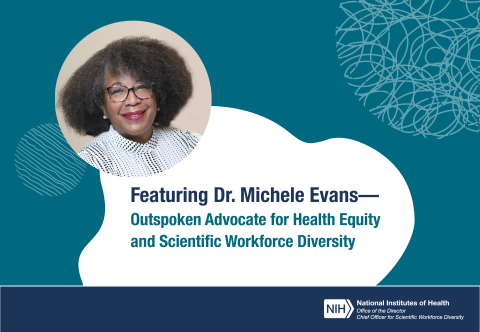“Representativeness in biomedical research is crucial. It’s important that we build diverse training populations and that people feel free to speak out.”
—Michele Evans, M.D., Senior Investigator, Laboratory of Epidemiology and Population Science, NIH National Institute on Aging

Photo of Michele Evans, M.D., National Institute on Aging. Credit: NIA
As those who know Dr. Evans can attest, when she speaks out, it’s best to listen.
Dr. Evans has achieved remarkable results as a member of the editorial board of the New England Journal of Medicine (NEJM), the lead investigator of a landmark study, and a mentor to generations of scientists. Her success is the result of many factors—not the least of which is speaking her mind. And for those who seek to be heard more often, Dr. Evans talked about what they can do. (Hint: Silence is not an option.)
A Sense of Urgency
Although Dr. Evans has been a member of the editorial board of the New England Journal of Medicine since 2013, her work took on a renewed sense of urgency in 2020.
After the murder of George Floyd and COVID-19 shed a harsh light on health inequities, Dr. Evans led a Journal roundtable on “Race and Medicine” and wrote several Journal perspectives. In “Health Equity—Are We Finally on the Edge of a New Frontier?” she wrote, “Now, engulfed in the catastrophic pandemic maelstrom, we are reckoning with a deadly triad—health disparities, health inequity, and unequal health care access—quantified in a daily body count.”
Dr. Evans always seems to have that triad and its consequences at the forefront of her work. “One of my major issues is representational diversity in clinical trials,” she said. “I was tired of seeing papers published where there’s a study on hypertension and only a very small fraction of the cohort is African American. How does that work if you’re accruing patients from Houston and Chicago and Detroit? I think that's a problem.”
She took on the part of this problem that she could, working with NEJM leadership. “Now, when papers are published in the Journal, they need to explain the demographics of their cohort and strive to have an inclusive study population, particularly for conditions that we know are associated with health disparities,” explained Dr. Evans.
To ensure greater representation of a diverse group of patients in research, Dr. Evans advocates for greater scientific workforce diversity. “Representativeness in biomedical research is crucial. It’s important that we build diverse training populations and that people feel free to speak out.”
A Paradigm Shift
Her willingness to speak out, and her experiences seeing how racial inequality and socioeconomic status can impair health outcomes drove her to develop a longitudinal epidemiologic observational study. Twenty years ago, the NIH, known as HANDLS, began.
“This was a paradigm shift in the intramural program of NIH overall to do community-based health disparities research,” she said, “With strong support from then Scientific Director Dan Longo and John Ruffin, then Director of the NIH Office for Minority Health Research, a forerunner to NIMHD, we were able to build the study and do clinical and translational research on health disparities on the streets of Baltimore and not in a hospital, clinic, or the NIH Clinical Center.”
This longitudinal study has followed 3,700 Baltimore residents—Black and White adults, ages 30-64. Every three to four years, researchers conduct follow-up medical, psychological, and physiologic evaluations.
“We set out to try to understand the interaction of race and socioeconomic status on health disparities and how they might act within a context of environmental, biological and psychosocial factors, and aging,” she said.
Dr. Evans’ hope is that through her research, new diagnostics and therapeutics can be developed to help narrow the disparities gap. “The success of HANDLS showed that in the intramural program, you can successfully do community-based clinical and basic biological health disparities research,” she said, “HANDLS helped change the culture.”
Diverse Perspectives
Changing the culture or even changing a mind or two requires speaking up, and Dr. Evans has been encouraging generations of mentees to do just that.
“We need to empower each other and especially trainees to advocate not only for themselves, but for those who need the assistance, who need help, and who have not had equal opportunity—particularly in the sphere of health care that is a right and not a privilege,” she said.
But Dr. Evans acknowledges that speaking up is not always easy and may require dedication, perseverance, and toughness. “People aren’t always going to like what you say, but you can’t give in to feeling sorry for yourself because forthrightness comes with a price,” she said.
“We all have different life experiences, life exposures, and different morally based thinking patterns. Your perspective is important.”
Through the COSWD blog, we ae proud to bring you multiple perspectives on scientific workforce diversity from NIH leaders. This year, we’ve heard from Drs. Michael Chiang, Neil Hanchard, Roland Owens, Karen Parker, and Nina Schor. I hope you will consider subscribing—and, of course, speaking out when you can

